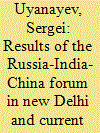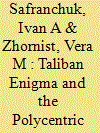| Srl | Item |
| 1 |
ID:
161032


|
|
|
|
|
| Summary/Abstract |
There is a widespread belief both in Russia and abroad that the Ukrainian crisis has undermined the system of international relations, which was built after the end of the Cold War at the turn of the 1990s and even since much earlier—after the end of World War II in 1945. This belief is corroborated with impressive analogies.The bone of contention then was the division of postwar Europe between the Soviet Union and the U.S. Now it is the struggle for influence in the post-Soviet area and in its second largest country after Russia—Ukraine. In former days, the geopolitical conflict took place amid the irreconcilable ideological confrontation between communism and capitalism.
|
|
|
|
|
|
|
|
|
|
|
|
|
|
|
|
| 2 |
ID:
155329


|
|
|
|
|
| Summary/Abstract |
This article discusses results of the 15th Russia-India-China (RIC) Academic Trilateral Conference held in Delhi at the start of 2017 and the current state of affairs in this format of international cooperation. Against the background of the debates that were held, the author analyzes certain results, challenges, and lessons of the 15-year development of cooperation in the RIC format, which continues to be an important factor in progressing to a polycentric world, and an instrument for strengthening relations of strategic partnership between Russia, China, and India.
|
|
|
|
|
|
|
|
|
|
|
|
|
|
|
|
| 3 |
ID:
164055


|
|
|
|
|
| Summary/Abstract |
The article examining current situation in the trilateral Russia-India-China cooperation format is examined in the context of the conclusions from the 16th RIC Academic Conference, held in Moscow in May 2018. It is confirmed that the RIC structure remains a notable priority in the policy of the three countries, a factor in progress toward a multipolar world, and an instrument for strengthening relations between the Russian Federation, China, and India.
|
|
|
|
|
|
|
|
|
|
|
|
|
|
|
|
| 4 |
ID:
180788


|
|
|
|
|
| Summary/Abstract |
Despite the general view on the Taliban1
as a proxy actor, it has become
capable of pursuing independent domestic and foreign policies. Two basic
options for the Taliban’s role in regional affairs are possible in the future.
Under the Taliban’s rule Afghanistan may become either a scene of rivalry
between great and regional powers, or a neutral zone with a revived buffer
function it performed long before the 1970s. The Taliban’s independent
policies make the latter option quite feasible. However, if global and
regional actors with vested interest do not ensure necessary international
conditions, Afghanistan’s neutral role will not be possible. More broadly, the
entitlement to an independent foreign policy granted by great powers as
they abstain from imposing their influence over Afghanistan suggests a new
feature of the current polycentric world. Instead of trying to enhance their
costly influence on various regions, great powers may prefer to keep each
other from doing so, thus creating new niches for small and middle powers.
|
|
|
|
|
|
|
|
|
|
|
|
|
|
|
|